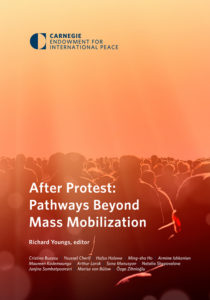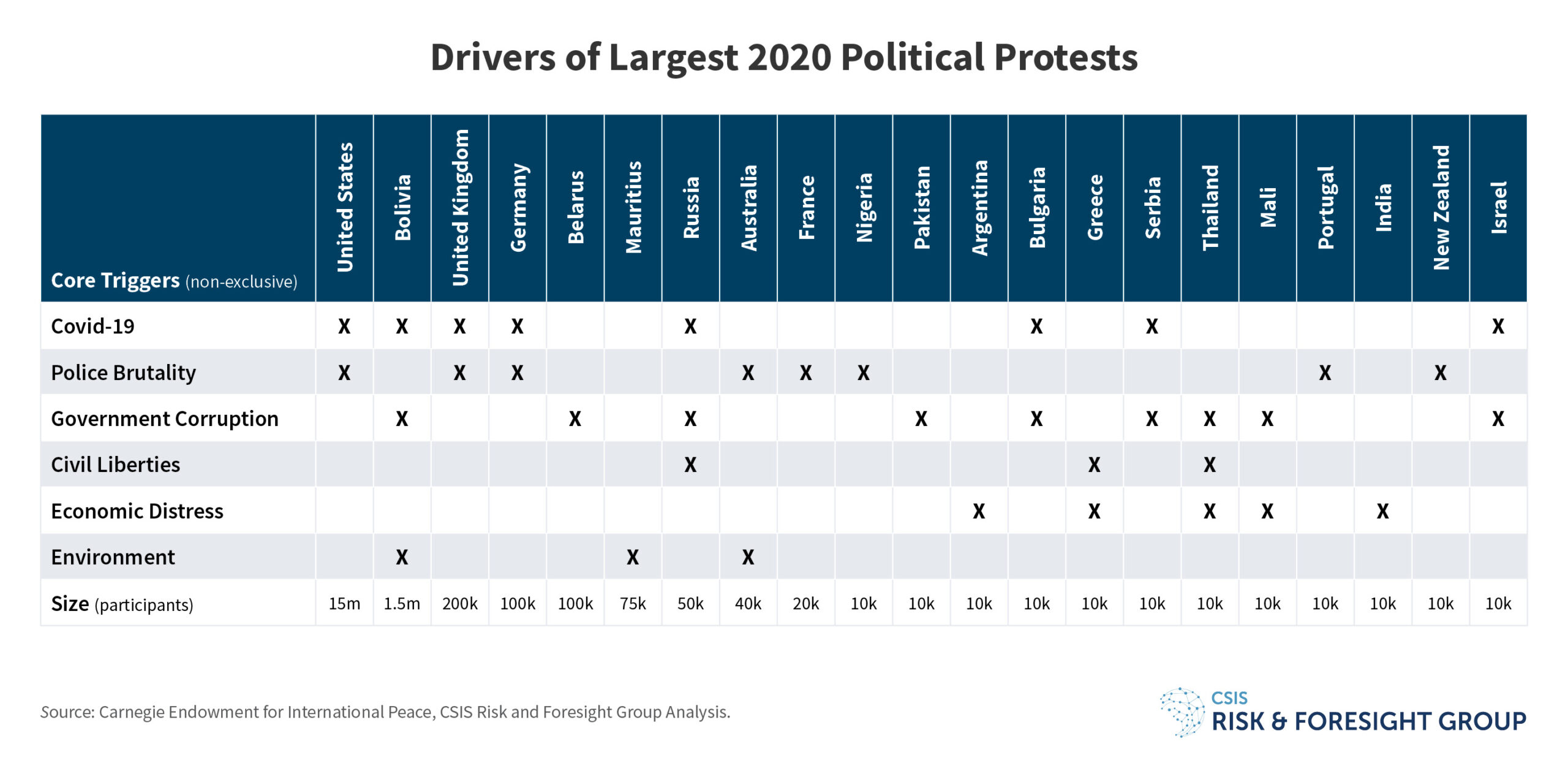The democratic recession was “hotly contested” in a striking surge of protests across the world in 2021, new research suggests.
Whereas 2020 demonstrated the resilience of protests amid the coronavirus pandemic, 2021 found protesters responding to—and shaping—the major dynamics roiling politics across the world. Data from Carnegie’s Global Protest Tracker (above) shows that seventy-six new significant antigovernment protests emerged last year, at a rate of roughly one new event every five days, according to Carnegie analysts Benjamin Press and Thomas Carothers:
The geographic breadth of protests in 2021 is striking: fifty-eight countries, from Malaysia and Paraguay to Georgia and Malawi, encountered significant antigovernment demonstrations during the year. Quite a few countries, including Burkina Faso, Paraguay, and the Solomon Islands, had not previously appeared in the tracker, which has logged protests since 2017. The addition of these new entries underscores how unrest has reached every corner of the world: roughly two-thirds of all countries have experienced at least one major antigovernment protest since 2017.
 A majority of protests — some 54 percent — were caused by a perceived failure of political systems or representation, with around 28 percent prompted by demands for “real democracy,” the most common of protesters’ demands, according to World Protests: A Study of Key Protest Issues in the 21st Century, a November 2021 study from Germany’s Friedrich-Ebert-Stiftung (FES) and the Initiative for Policy Dialogue, a nonprofit group based at New York’s Columbia University.
A majority of protests — some 54 percent — were caused by a perceived failure of political systems or representation, with around 28 percent prompted by demands for “real democracy,” the most common of protesters’ demands, according to World Protests: A Study of Key Protest Issues in the 21st Century, a November 2021 study from Germany’s Friedrich-Ebert-Stiftung (FES) and the Initiative for Policy Dialogue, a nonprofit group based at New York’s Columbia University.
Many of last year’s protests shared one of four crosscutting drivers, Carnegie’s Press and Carothers add:
Resistance to coups and rising authoritarianism. 2021 was a record year for coups, and most provoked significant popular resistance. In Myanmar and Sudan, hundreds of thousands of protesters demanded a return to civilian rule after the countries’ militaries seized power. So, too, did thousands of activists in Chad. … The surge in coups was just one part of a broader democratic recession that was hotly contested by demonstrators around the world. In Bolivia, Russia, and Senegal, thousands called out the arrests of prominent opposition leaders….
Fierce political contestation. Beyond resistance to authoritarianism, other types of high-stakes political battles spilled out into the streets of many countries. Such disputes often centered around elections or controversial judicial decisions with political ramifications. In Georgia, protesters expressed concerns over electoral integrity and condemned the arrest of former president Mikheil Saakashvili. In Peru, supporters of presidential candidate Keiko Fujimori alleged improper interference in the country’s tight presidential election, while in Bolivia, supporters of former president Jeanine Áñez criticized her arrest and detention….
 Frustration with public health responses. As the pandemic entered its second year, citizens in many places protested public health measures, including lockdowns, mask mandates, and vaccine requirements. Such protests were especially prevalent in Western democracies…. In contrast to those arguing for less intervention, however, protesters in many other places took issue with insufficient or mishandled government efforts…..
Frustration with public health responses. As the pandemic entered its second year, citizens in many places protested public health measures, including lockdowns, mask mandates, and vaccine requirements. Such protests were especially prevalent in Western democracies…. In contrast to those arguing for less intervention, however, protesters in many other places took issue with insufficient or mishandled government efforts…..
Economic insecurity. … As the pandemic weighed on state budgets and prompted governments to tighten their belts, protests erupted in response to unpopular austerity proposals….This was particularly clear in Cuba, where the largest demonstration in decades broke out amid a severe shortage of food and medicine, which many ascribed to the failure of the country’s command-style economy…..The unexpected outbreak of massive protests in Kazakhstan at the start of 2022 offered a vivid reminder of how a seemingly small grievance—an increase in natural gas prices—can provoke large-scale citizen demonstrations that upend a country’s politics. RTWT
The Carnegie findings confirm the trend identified in a CSIS analysis which found that in the course of 2020, 68 countries experienced mass protest movements, with violence erupting around protests in more than 18 countries—a sharp and worrisome uptick from 2019.








